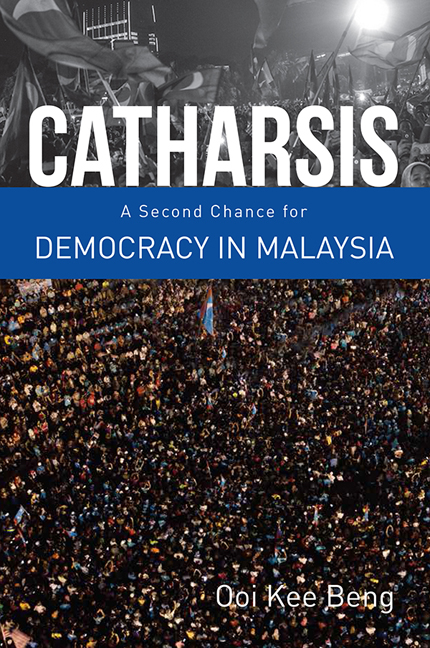Book contents
- Frontmatter
- Contents
- Foreword
- 1 Introduction – Malaysia's Future Is Redeemed
- Before Pakatan Harapan
- Before 9 May 2018
- 12 Racialising the Un-racialisable: What Is the Red Shirt Rally All About?
- 13 One Country's Merdeka Is Another's Damage Control
- 14 Malaysia – Where Politics Must Be Ethnically Inclusive and Exclusive at the Same Time
- 15 Is Malaysia at a Crossroads or in a Quagmire?
- 16 Unity Without Solidarity Sows Disunity
- 17 UMNO and Looking Back at History
- 18 Sarawak Forces Federal Opposition to Do Deep Soul-searching. But Can It?
- 19 By-elections Reveal New Malay Politics
- 20 Interview with Mahathir Mohamad: ‘People Must Be Able to Hold Their Heads Up.’
- 21 Malaysia Has to Start Re-examining Its Histories
- 22 Waves from US Probe into 1MDB May Turn into Tsunami
- 23 Seeking a New Formula to Unite Malaysia's Diversity
- 24 Time for Anwar to Accept Mahathir's Olive Branch?
- 25 Najib, Mahathir and the Timing of Malaysia's Polls
- 26 Excessive Governance Is Not Good Governance
- 27 Why Malaysia's Opposition Will Take to the Streets Again
- 28 Merdeka is About The Individual, Too
- 29 A Battle Between Malay Leaders Over Malaysia's Future
- 30 The Primacy of Political Economy in Asia
- With Mahathir at the Helm
- Beyond 9 May 2018
- About the Author
23 - Seeking a New Formula to Unite Malaysia's Diversity
from Before 9 May 2018
Published online by Cambridge University Press: 12 February 2019
- Frontmatter
- Contents
- Foreword
- 1 Introduction – Malaysia's Future Is Redeemed
- Before Pakatan Harapan
- Before 9 May 2018
- 12 Racialising the Un-racialisable: What Is the Red Shirt Rally All About?
- 13 One Country's Merdeka Is Another's Damage Control
- 14 Malaysia – Where Politics Must Be Ethnically Inclusive and Exclusive at the Same Time
- 15 Is Malaysia at a Crossroads or in a Quagmire?
- 16 Unity Without Solidarity Sows Disunity
- 17 UMNO and Looking Back at History
- 18 Sarawak Forces Federal Opposition to Do Deep Soul-searching. But Can It?
- 19 By-elections Reveal New Malay Politics
- 20 Interview with Mahathir Mohamad: ‘People Must Be Able to Hold Their Heads Up.’
- 21 Malaysia Has to Start Re-examining Its Histories
- 22 Waves from US Probe into 1MDB May Turn into Tsunami
- 23 Seeking a New Formula to Unite Malaysia's Diversity
- 24 Time for Anwar to Accept Mahathir's Olive Branch?
- 25 Najib, Mahathir and the Timing of Malaysia's Polls
- 26 Excessive Governance Is Not Good Governance
- 27 Why Malaysia's Opposition Will Take to the Streets Again
- 28 Merdeka is About The Individual, Too
- 29 A Battle Between Malay Leaders Over Malaysia's Future
- 30 The Primacy of Political Economy in Asia
- With Mahathir at the Helm
- Beyond 9 May 2018
- About the Author
Summary
The issue of Bangsa Johor, Johor nationality, made national news again on Wednesday, when former Prime Minister Mahathir Mohamad was asked about it at a forum on relations between the federal government and state governments.
Asked about Johor's separation from Malaysia, a national concern fanned by provocative comments made by Johor's Crown Prince, Tunku Ismail Sultan Ibrahim, Tun Dr Mahathir replied that such a separation would encourage ‘unhealthy’ feelings of superiority and harm the unity of the federation.
The issue of ‘Bangsa Johor’ is hugely interesting on several levels. It acts as a reminder that despite the centralised nature of Malaysian governance, the country was sewn together in the 1940s, 1950s and 1960s as a federation. This was clearly reflected in the country's 1957 Constitution.
This solution, worked out for a smooth decolonisation process, sought to acknowledge diversity while uniting a miscellany of state formations, identities and loyalties. Over the last half-century, however, much has happened to undermine this compromise.
The role of race champion that the Malay-based UMNO developed for itself quickly skewed the national inter-ethnic compromise and its consequent federal system to such an extent that being Malay became more important to most of its followers than becoming Malaysian.
It also led to the power-sharing system that united the nation's diverse groups from the very beginning being overwhelmed by the huge dominance of this ethnocentric party.
Not only had this train of events for decades been encouraging ‘unhealthy feelings of superiority’ among some Malaysians against others, but it also damaged the ability of the federation to argue for diversity as a strength. Instead, diversity became the country's major problem. And this diversity is as much intra-Malay as it is inter-ethnic or inter-regional.
The Johor case is symptomatic of this process having gone too far and occurs alongside other recent expressions of Malay opposition to UMNO power and to its self-proclaimed mandate to champion Malayness and Malaysianness.
These new expressions include Dr Mahathir's newly formed party, Parti Pribumi Bersatu Malaysia (Bersatu), not to mention Parti Amanah Negara recently established by dissidents from the Islamist party PAS or Anwar Ibrahim's Parti Keadilan Rakyat formed in the late 1990s.
- Type
- Chapter
- Information
- CatharsisA Second Chance for Democracy in Malaysia, pp. 82 - 84Publisher: ISEAS–Yusof Ishak InstitutePrint publication year: 2018

